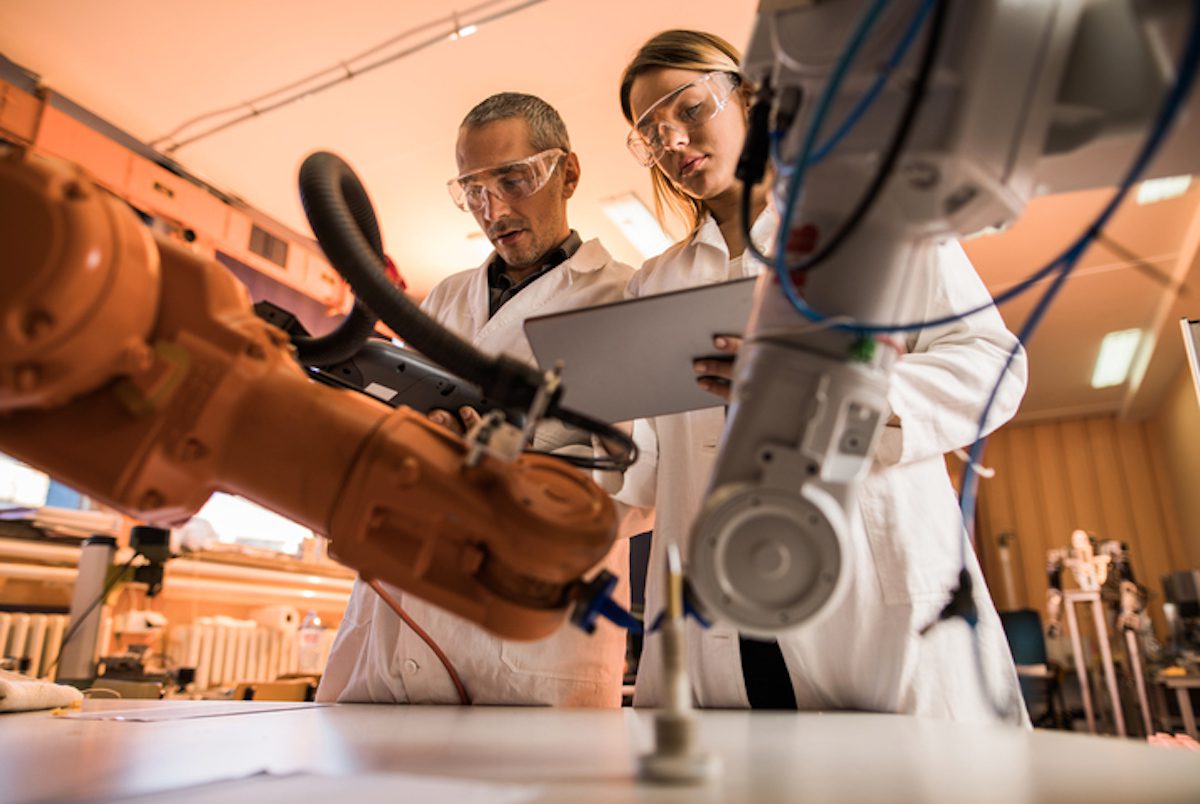Global Courant 2023-05-10 09:46:36
After a slow start, India is starting to realize its potential as a promising market for industrial robots and as a developer of robot technology.
According to data from the International Federation of Robotics (IFR), the number of industrial robot installations in India will increase by 54% to 4,945 units by 2021. This put India in 10th place globally, behind Mexico but ahead of Canada, Thailand, Singapore and Spain. Data for 2022 is not yet available.
The automotive industry is the largest consumer of industrial robots in India, accounting for 31% of total installations by 2021. Other major user industries include metals and machinery, plastics and chemicals, electrical and electronic equipment, and pharmaceuticals and food.
In a May 3 statement, IFR President Marina Bill noted that “India is one of the fastest growing industrial economies in the world. Within five years, the operational stock of industrial robots has more than doubled to 33,220 units in 2021. This corresponds to an average annual growth rate of 16% since 2016.”
Since the launch of the “Make in India” program by Prime Minister Modi in 2014, the operational stock of industrial robots in India has tripled. But it’s still a drop in the ocean compared to the 1.2 million units installed in China and nearly 400,000 units in Japan.
China, long known as the “factory of the world” when Western economies shipped production abroad, is so far ahead of other countries in industrial robot deployment that comparisons are almost meaningless. In 2021, more industrial robots will be installed in China (268,000) than in the rest of the world combined (249,000).
Japan is second (47,000), followed by the US in third (35,000), South Korea (31,000), Germany (24,000), and Italy (14,000). Realistically, India should be able to triple its annual installations and overtake Italy and then Germany in the near future.
China also ranks highly in terms of industrial robot density, as measured by the number of robots per 10,000 manufacturing workers. In 2021, mainland China ranked fifth after South Korea, Singapore, Japan and Germany. Hong Kong and Taiwan ranked seventh and eighth, Sweden sixth. The US ranks ninth, down from seventh last year.
The robot density in the Indian auto industry was 148 robots per 10,000 employees in 2021. The figure for the Chinese auto industry was 772, compared to 332 for all of China’s manufacturing. The scope of the challenge and the opportunity for India are both clear.
South Korea set a record high of 1,000 robots per 10,000 manufacturing workers by 2021. This was a function of the country’s large and technologically advanced electronics and automotive industries.
The figure for Singapore, which has a concentration of advanced industries, was 670. The figures for Japan and Germany, which have a much broader industrial base, were 399 and 397. In the US, the figure was 274.
As in China, the largest suppliers of industrial robots in India today are the world leaders: Fanuc, Yaskawa and other Japanese companies, as well as Universal Robots, ABB and Kuka. Universal Robots is a Danish company owned by Teradyne of the US. ABB is headquartered in Switzerland. Kuka is a German company owned by the Chinese Midea Group.
But there are plenty of Indian robot companies – so many with outstanding features that the top ten and other leading company lists published by various market research firms overlap, but are not the same. Among those appearing on these lists that illustrate the range of Indian robot manufacturing and technologies are:
Precision Automation & Robotics India (Wipro PARI), a major supplier of integrated industrial robots and factory automation systems headquartered in Pune, Maharashtra, with operations in India, Europe and the US. Hi-Tech Robotic Systemz, a supplier of autonomous mobile robots used in factories and warehouses headquartered in Gurgaon, Haryana. It also provides autonomous systems and driver assistance systems to rationalize and improve the safety of industrial fleet management on public roads. Gridbots, a manufacturer of industrial, military, aerospace and nuclear power plant robotics, self-driving military vehicles and machine vision inspection systems headquartered in Ahmedabad, Gujarat. Asimov Robotics, a provider of robotics hardware, software and robotics consulting services headquartered in Kochi, Kerala. Aimed at medical and healthcare with particular expertise in autonomous transport between patients in intensive care/isolation and clinical laboratories. It also serves R&D and deployment projects in surgery, aerospace and defense, and creates service robots used in hazardous and other challenging environments. DiFACTO Robotics, a global supplier of industrial robots and other factory automation equipment and services headquartered in Bengaluru (Bangalore), Karnataka. Systematics, headquartered in Bengaluru, is the first company to design and manufacture fully collaborative robots (cobots) in India. Products include 6-axis robotic arms that can share work space with humans without a safety fence. Invento Robotics, a manufacturer of humanoid service robots for retail, banking, healthcare, events and other applications that use voice recognition, facial recognition, indoor navigation and fleet management algorithms. MCI Robotics, a designer and manufacturer of robots for materials handling, assembly, welding, grinding, milling, polishing, painting, sealing and dispensing, headquartered in Chennai, Tamil Nadu. CynLr (Cybernetics Laboratory), a provider of machine learning-based machine vision technology that enables assembly, logistics and other robots to identify and handle objects without training.
Tracxn Technologies Limited, a global startup data platform headquartered in Bengaluru that partners with venture capital and other financial firms around the world, has identified 47 industrial robotics startups in India. Given the country’s high level of education, industrial momentum and entrepreneurial spirit, many more will undoubtedly follow in the future.
The All India Council for Robotics & Automation (AICRA) is a non-profit organization dedicated to making India a leader in robotics, the Internet of Things (IoT) and Artificial Intelligence (AI). It provides technical and other assistance to the more than 3,500 member organizations and professionals. AICRA’s mission statement is:
Upgrade robotics, IOT and AI skills to international standards through significant industry involvement and develop necessary frameworks for standards, curriculum and quality assurance. Enhance, support and coordinate private sector initiatives for technical skills development through appropriate engagement models; strive for significant operational and marketing involvement. Play the role of a “market maker” by raising finance, especially in industries where market mechanisms are ineffective or lacking. Establish India as a hub for innovation, products and technology start-ups. Be an industry platform for sharing and building best practices and collaborative engagement.
AICRA has established Technology Governance Steering Committees (TGSCs) for defense, healthcare, agriculture, startups, education and aerospace. It has also signed a Memorandum of Understanding with the Chandigarh Group of Colleges (CGC) in Punjab to establish an Industry 4.0 Center of Excellence to provide students with ideas, learning materials, training and hands-on experience in Robotic Process Automation, Robotic Control System (ROS) open source software and other technology.
The All India Robotics Association (AIRA) is a non-profit organization established to develop and support robotics ventures in areas such as regulatory approvals, financing, importation of electronic components, manufacturing technologies and skills development.
AIRA aims to create the ecosystem needed to make India a global hub for robot manufacturing and technology.
That is a project for the next two decades, one that is likely to change India and the global economy beyond recognition.
Follow this writer on Twitter: @ScottFo83517667
Similar:
Loading…








